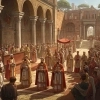Roman Emperor Maximinus Thrax
Maximinus Thrax: The Giant Who Became Emperor
Maximinus Thrax, born Gaius Julius Verus Maximinus around 173 CE, holds the distinction of being the first Roman emperor of non-senatorial, even non-aristocratic, origin. A man of humble birth and immense physical stature, Maximinus's rise to power as emperor in 235 CE marked a significant turning point in Roman history. His reign, which lasted until 238 CE, was characterized by military aggression, strained relations with the Roman Senate, and the beginning of the Crisis of the Third Century—a period of intense instability and civil strife that would plague the Roman Empire for nearly 50 years. Maximinus's story is one of ambition, brutality, and the challenges of ruling an empire under constant threat from both internal and external forces.
Early Life and Background
Maximinus Thrax was born in the province of Thrace (modern-day Bulgaria and parts of Greece and Turkey) to a family of humble origins. His father was a peasant of Gothic descent, and his mother was of Alanic heritage, making Maximinus one of the few Roman emperors with a mixed barbarian background. Little is known about his early life, but he was reportedly a shepherd before joining the Roman army.
Maximinus was renowned for his extraordinary physical strength and size, with ancient sources claiming he stood over 8 feet tall. While these accounts are likely exaggerated, they highlight the impression he made on his contemporaries. His imposing presence and martial abilities quickly distinguished him in the Roman military, where he rose through the ranks during the reigns of emperors Septimius Severus, Caracalla, and Severus Alexander.
Despite his lack of formal education and refinement, Maximinus earned a reputation as a competent and fearless soldier. His military career was marked by numerous campaigns along the frontiers of the Roman Empire, particularly against the Germanic tribes, where he demonstrated both his prowess in battle and his leadership abilities. These qualities eventually brought him to the attention of Severus Alexander, who appointed him as a commander in the Roman legions.
The Rise to Power
Maximinus's rise to the imperial throne was as dramatic as it was unexpected. By 235 CE, the Roman Empire was facing significant external threats, particularly from the Germanic tribes along the Rhine and Danube frontiers. Severus Alexander, the reigning emperor, embarked on a military campaign to address these threats, but his approach of negotiating with the tribes rather than engaging them in open battle led to widespread dissatisfaction among the Roman legions.
The soldiers, frustrated by what they perceived as the emperor's weakness and unwillingness to confront Rome’s enemies decisively, began to lose confidence in Severus Alexander. Maximinus, a general who shared the hardships of his troops and was well-respected for his martial abilities, became the focal point of the soldiers’ discontent.
In March 235 CE, while the imperial army was encamped near Mogontiacum (modern-day Mainz, Germany), a mutiny broke out among the troops. The soldiers, angered by Severus Alexander’s leadership and influenced by their commanders, proclaimed Maximinus as emperor. The young Severus Alexander and his mother, Julia Mamaea, were murdered by the mutinous soldiers, bringing an end to the Severan dynasty.
Maximinus, who had no previous ambitions for the throne, suddenly found himself thrust into the position of emperor. His accession marked a significant break from tradition, as he was the first emperor to rise from such a humble background, without the support of the Senate or the aristocracy. His reign would reflect both the strengths and weaknesses of his unconventional path to power.
Military Campaigns and Foreign Policy
Maximinus Thrax’s reign was defined by his military focus and the challenges of defending the Roman Empire's vast borders. Upon becoming emperor, he immediately set about consolidating his power and securing the loyalty of the legions, who had been instrumental in his rise. To this end, he lavished the army with gifts, increased pay, and promised further rewards for successful campaigns.
One of Maximinus's first acts as emperor was to continue the military campaign against the Germanic tribes along the Rhine and Danube frontiers. Unlike Severus Alexander, Maximinus was determined to engage the enemy directly. He led the Roman legions across the Rhine, launching a series of aggressive offensives against the Germanic tribes, including the Alamanni and the Quadi. These campaigns were brutal and destructive, earning Maximinus the respect and loyalty of his soldiers but also further alienating the civilian population and the Senate, who saw him as a tyrant.
Maximinus's military success was short-lived, as the costs of his campaigns placed a heavy burden on the empire's finances. To fund his military ventures, Maximinus imposed heavy taxes on the provinces and confiscated the wealth of the Roman elite, actions that fueled resentment and unrest throughout the empire. Additionally, his focus on military matters meant that other aspects of governance, such as the administration of justice and the welfare of the people, were neglected.
Relations with the Senate and Domestic Policy
Maximinus Thrax’s relationship with the Roman Senate was fraught with tension from the outset. As a man of humble origins with no connections to the aristocracy, Maximinus was viewed with suspicion and disdain by the senatorial class. His lack of refinement, education, and experience in civil administration further deepened the divide between him and the Senate.
Maximinus, for his part, was deeply distrustful of the Senate, seeing them as a potential threat to his power. He took a hostile approach to senatorial authority, sidelining the traditional advisory role of the Senate and ruling largely through military commanders and loyalists. Many senators were stripped of their positions and wealth, either through confiscation or execution, as Maximinus sought to eliminate any potential rivals.
One of the most significant events of Maximinus’s reign was his decision to relocate the imperial court to the northern frontiers, where he could more effectively oversee military operations. This move further distanced him from the political center of Rome and its traditional institutions. It also meant that Maximinus ruled largely in absentia, leaving much of the day-to-day administration of the empire to his subordinates, many of whom were military men with little experience in governance.
Domestically, Maximinus's reign was marked by increased centralization of power and a focus on maintaining military discipline. The emperor’s reliance on the army as his primary base of support led to further militarization of the Roman state. However, his heavy-handed policies, particularly his harsh taxation and confiscation measures, created widespread discontent among the civilian population.
The Crisis of 238 CE: The Year of the Six Emperors
Maximinus Thrax's reign came to an abrupt and violent end during the crisis of 238 CE, a year that would come to be known as the “Year of the Six Emperors” due to the rapid succession of claimants to the throne.
The spark that ignited the crisis was a revolt in the province of Africa (modern-day Tunisia and parts of Algeria and Libya), where landowners and aristocrats, angered by Maximinus’s oppressive taxation policies, rose up in rebellion. They declared two local aristocrats, Gordian I and his son Gordian II, as co-emperors. The Senate in Rome, seizing the opportunity to rid themselves of Maximinus, quickly endorsed the Gordians as legitimate rulers.
Maximinus, who was still campaigning on the northern frontiers, responded by marching his army towards Italy to crush the rebellion. However, the Gordians’ reign was short-lived; Gordian II was killed in battle against a loyalist governor in Africa, and his father, Gordian I, committed suicide upon hearing the news. With the Gordians dead, the Senate hastily appointed two new emperors, Pupienus and Balbinus, in a desperate bid to unite against Maximinus.
As Maximinus advanced on Rome, he encountered increasing resistance. His heavy-handed methods had alienated much of the population, and his troops were weary from constant campaigning. When Maximinus laid siege to the city of Aquileia in northern Italy, his soldiers, exhausted and demoralized, began to turn against him. Sensing an opportunity, a group of his officers plotted his assassination.
In May 238 CE, Maximinus Thrax was murdered by his own soldiers, along with his son and co-emperor, Maximus. Their bodies were decapitated, and their heads were sent to Rome as a symbol of the end of Maximinus’s reign. The Senate, relieved to be rid of the tyrant, immediately recognized Pupienus and Balbinus as the new emperors, though their rule would also be short-lived.
Legacy
Maximinus Thrax’s legacy is a controversial one, shaped by his extraordinary rise to power and his tumultuous reign. He is often remembered as a symbol of the militarization of the Roman Empire, a period where the loyalty of the legions became the primary factor in determining the legitimacy of an emperor. His rule marked a significant shift away from the traditional senatorial aristocracy's influence, reflecting the growing power of the military in Roman politics.
Maximinus's reign also heralded the beginning of the Crisis of the Third Century, a period of nearly 50 years during which the Roman Empire would experience severe political instability, economic decline, and external threats. His inability to maintain the delicate balance between military power and civilian governance contributed to the unraveling of the Roman state during this time.
Despite his flaws as a ruler, Maximinus Thrax’s story is a testament to the volatile nature of power in the Roman Empire. His rise from humble beginnings to the highest office in the empire, followed by his rapid fall, illustrates the precariousness of imperial authority during a period of increasing instability. Maximinus’s reign, though brief, left a lasting impact on the Roman Empire, setting the stage for the challenges that would define the remainder of the third century.
Show off your love for history with a custom baseball jersey featuring the colors and symbols of the Roman legions. Whether for casual wear or a themed event, this unique apparel is perfect for history buffs.
Maximinus Thrax was an unusual Roman emperor. Unlike his predecessors, he didn't hail from the privileged classes but rose through the ranks of the military due to his immense strength and courage. Born a Thracian, he was a stark contrast to the typically aristocratic rulers of Rome. His reign marked a turning point, as he was the first 'barracks emperor,' a title given to those who ascended to power through military support rather than political maneuvering. This marked the beginning of a tumultuous period in Roman history known as the Crisis of the Third Century.
Despite his humble origins and military prowess, Maximinus' reign was marked by brutality and heavy taxation. His policies alienated the Senate and many provinces. Ultimately, this led to widespread rebellion and his eventual assassination. His story is a fascinating example of how Rome's traditional power structures were shifting in the face of growing military influence.

















Latest




Popular




Useful




